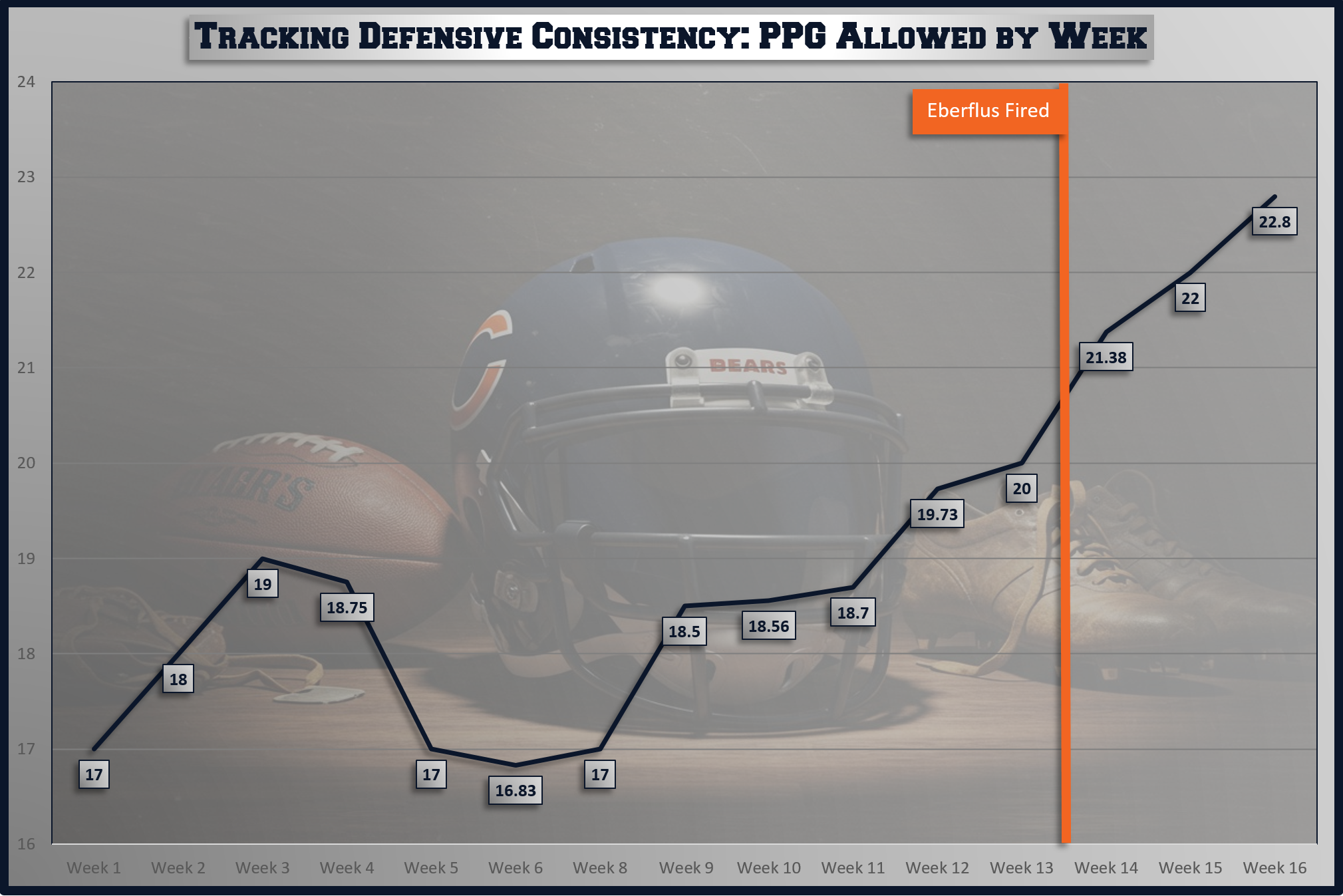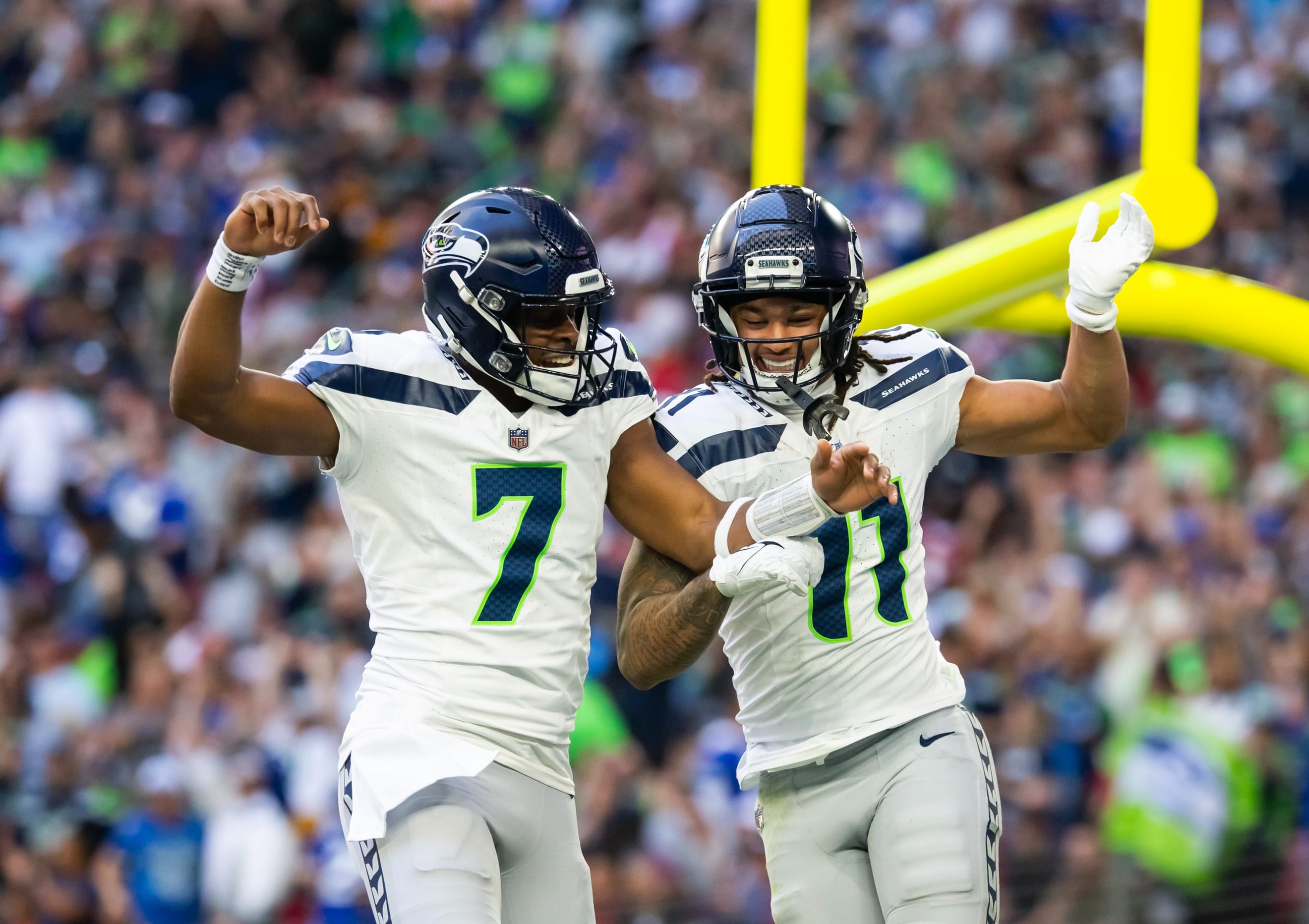
Quick Slant: TNF - Where These Teams Might Belong Tomorrow
Seahawks @ Bears, Thursday @ 8:15 PM
The magnitude of Thursday’s game might be a matter of who you ask; for Chicago, it is that moment, suspended in time before an inevitable impact—where there is no longer hope of avoiding the sickening crunch, the busted glass; there is only hope that what is coming won’t tear you to irreparable bits. Seattle lacks the self-awareness that they may not measure up to the dominant teams in the NFC; they pursue their aspirations with an unyielding determination until continuing becomes impossible.
Fresh off a hauntingly close loss to the Vikings, arguably the best team in the NFC, Seattle now sits a game behind the Rams in the NFC West, their margin for error dropping like Chicago’s December Fahrenheit. Rookie head coach Mike Macdonald inherited an impossible legacy from Pete Carroll—a streak of success spanning decades—but low and behold, his authorship emerges. The Seahawks’ defense, once a liability, has turned the corner. But hope is transitory, and their playoff odds may hinge on pocketing this game against a spiraling opponent.
Questions linger; their offensive line tries to undo them from within like an act of espionage—their running game is inconsistent, and the tenured journeyman who leads them is unproven at crunch time. Geno Smith is unglamorous and perpetually overlooked; in that way, he embodies the very code written in Seattle’s DNA. Once an NFL drifter, now a quiet cornerstone, Smith isn’t rewriting NFL record books, but he’s keeping Seattle alive with a no-nonsense approach that eases the uncertainty of a season suspended in the balance.
For the Bears, hope has long been extinguished. A season once teeming with optimism—a new franchise QB in Caleb Williams, the most heralded prospect since Trevor Lawrence, merging with a roster that was already 7-10 without him—has turned into a grim march toward a finish line that couldn’t come soon enough. Chicago’s blowout loss to Detroit last week wasn’t another tally in the loss column; it was an indictment of their entire operation. With sky-high expectations and an allegedly good supporting cast, Williams hasn’t yet found footing. A generational talent thrust into a crumbling infrastructure. His rookie campaign has answered no questions—only asked more. Was Williams destined to be the savior or another victim of Chicago’s eternal dysfunction?
Thursday night is less a game than an assessment test. It’s a chance for Seattle to stay in the mix and prove that their underdog narrative has legs in the brutal NFC playoff race. For Chicago, it’s about salvaging something—anything—from a future that already seems compromised. Football rarely offers easy resolutions, but this matchup will say plenty about where both franchises stand—and where they might belong tomorrow.
Seahawks’ Implied Team Total: 23
The Seahawks run fast at 27.6 neutral script seconds to snap with a neutral pass rate of 61%. Both of these rates are in the top six. They spend 34.2% of their time trailing by at least seven, which is when their pass rate increases to a league-leading 74%. In the aggregate, they run 64 offensive plays per 60 minutes, which is about average, and they maintain a 65% run rate, tied for second, and 25.3 seconds to snap, ranking fourth.
Seattle ranks 18th in EPA per play and 16th in offensive success rate. They rank 19th in EPA per dropback and 15th in offensive success rate on dropbacks.
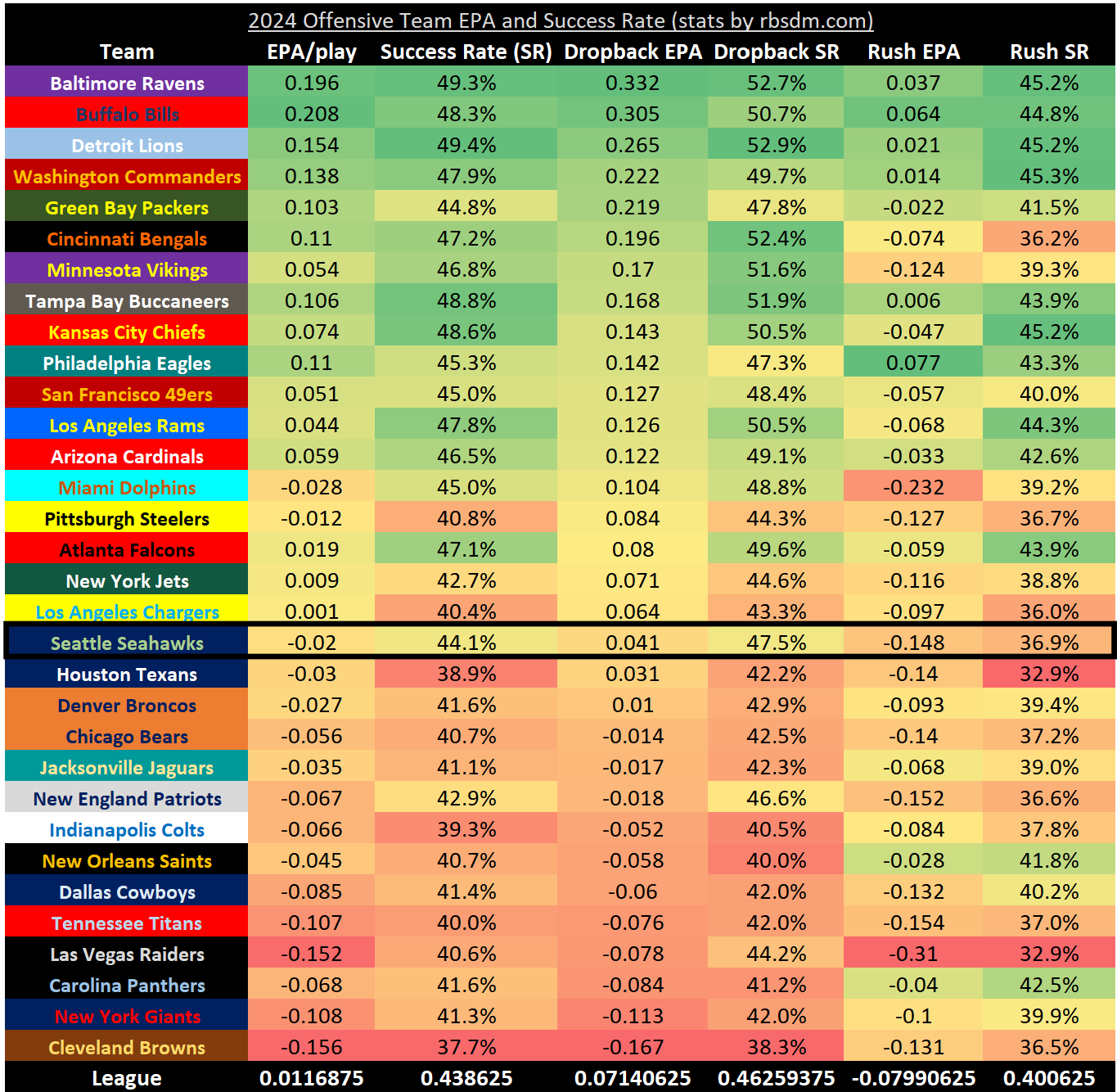
They are led by Smith, who was forced into a starting role in a hopeless situation for Gang Green in North Jersey and was proven to be immature and ineffective as a starter; then, humbled for over half a decade, toiling as a backup, and finally given an opportunity to take the reins in Seattle after Russell Wilson was traded to Denver in 2022. He has been an entirely different player.
In 2022, Smith was the QB5 in fantasy and led the Seahawks to the playoffs. For years, it had been assumed that Wilson, who led a very run-heavy attack that relied heavily on play-action—a system Wilson was objectively good at running—was being held back from the upper echelon by being miscast as a game manager. As Wilson flailed badly in Denver, Smith picked up where Wilson had left off in Seattle. Not only so, but after largely ignoring the calls to let Russ cook for years, the Seahawks went from 18th in pass rate over expected (PROE) to eighth in the very year he left the building, evidence that seemed especially damning for Wilson’s case as one of the league’s elites. "Maybe," people concluded, "the Seahawks’ system was an underrated kingmaker, and Wilson, detached from it, was proven false. Maybe," they continued, "the Seahawks realized quickly that Smith was better, and they entrusted him with more responsibility—a responsibility that they had always known Wilson wouldn’t have been able to handle."
Some of these narratives are fun; some have already been undone to some degree. In one part, Smith has never equaled his 2022 campaign. That year, Smith was second in completion percentage, eighth in passing yards, fourth in passing TDs, eighth in rushing yards, and sixth in FPOE. His efficiency has never ridden as high in the two years since. However, he has probably proven to be a league-average QB, so the volume he’s received this season (fourth in passing attempts) has been enough under normal circumstances.
In ways, he has come through. He ranks third in completions, fourth in completion percentage, third in passing yardage, and eleventh in EP. However, he has not produced as much as a runner as he did in 2022, and more importantly, he’s not scoring TDs. He is a significant regression candidate based on TDs/YDs.
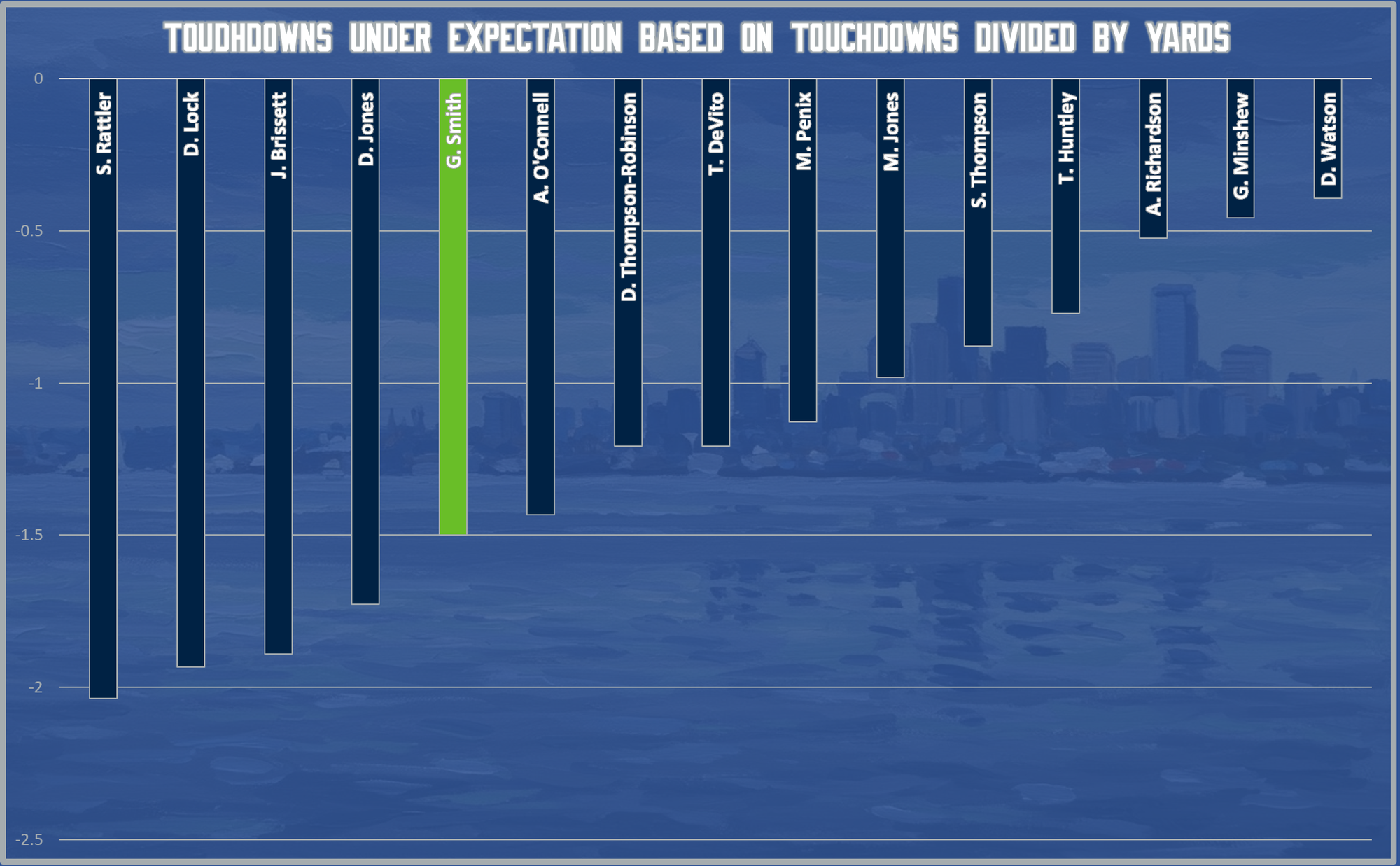
This is after Smith recorded three TDs last week against Minnesota; before that, he had the lowest TDOE in the league based on TDs/YDs.
Smith has been pressured more than any other quarterback in the league, with 232 total pressures. The Seahawks are in the middle of the pack in pressure rate over expected (PrROE), which would seem to indicate this is self-inflicted. He also doesn’t handle pressure very well. His is the third-most significant drop-off in QB Rating while pressured versus when kept clean. The Bears only generate 0.48% PrROE, 18th in the league.
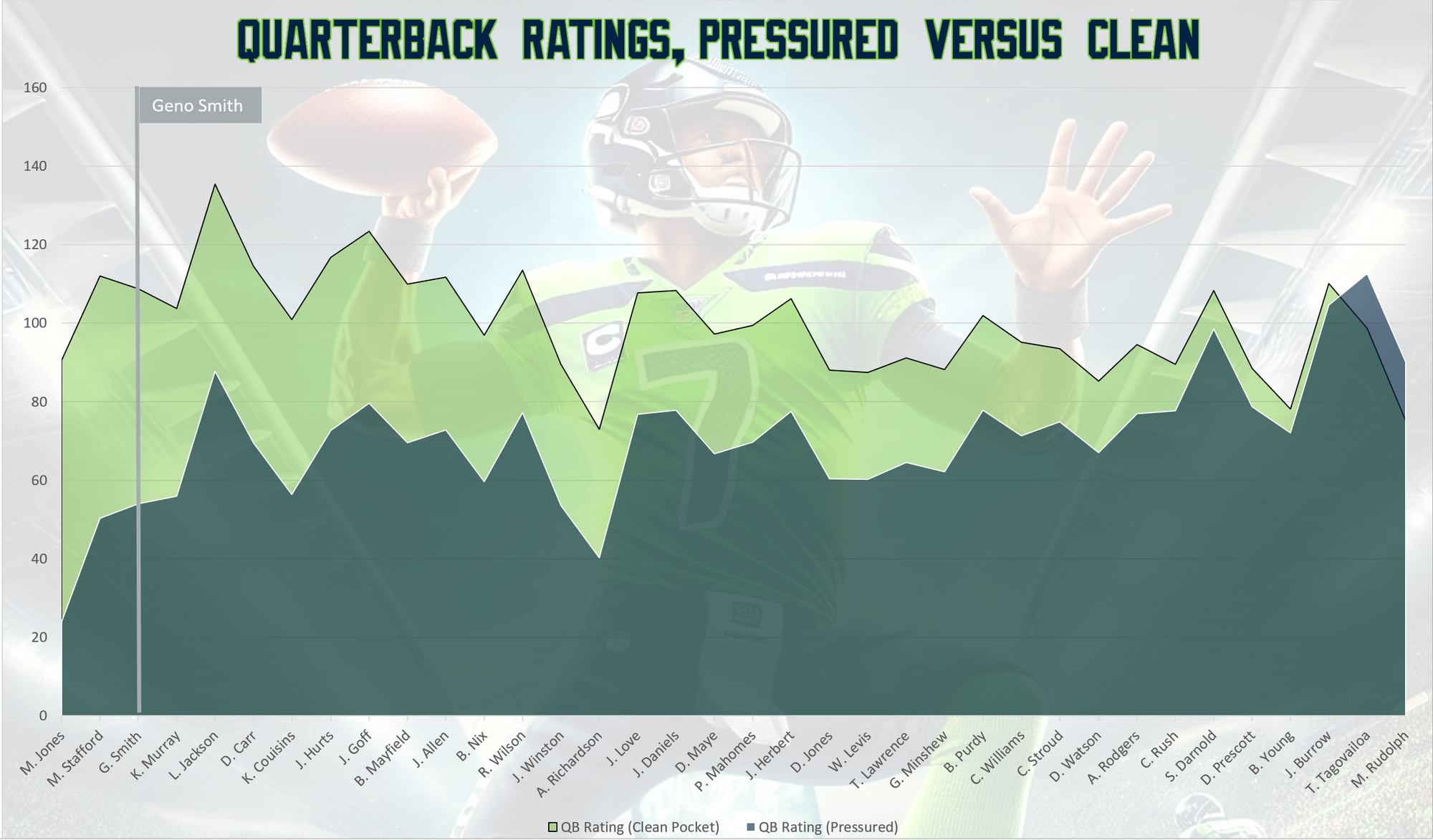
Four players have at least a 15% market share in the last six Seahawks’ games: Jaxon Smith-Njigba (27%), DK Metcalf (20%), Noah Fant (16%), and Kenneth Walker III (15%). Walker and Fant were active for only four games within the sample, and Walker will miss this week’s game with a new injury he sustained last week.
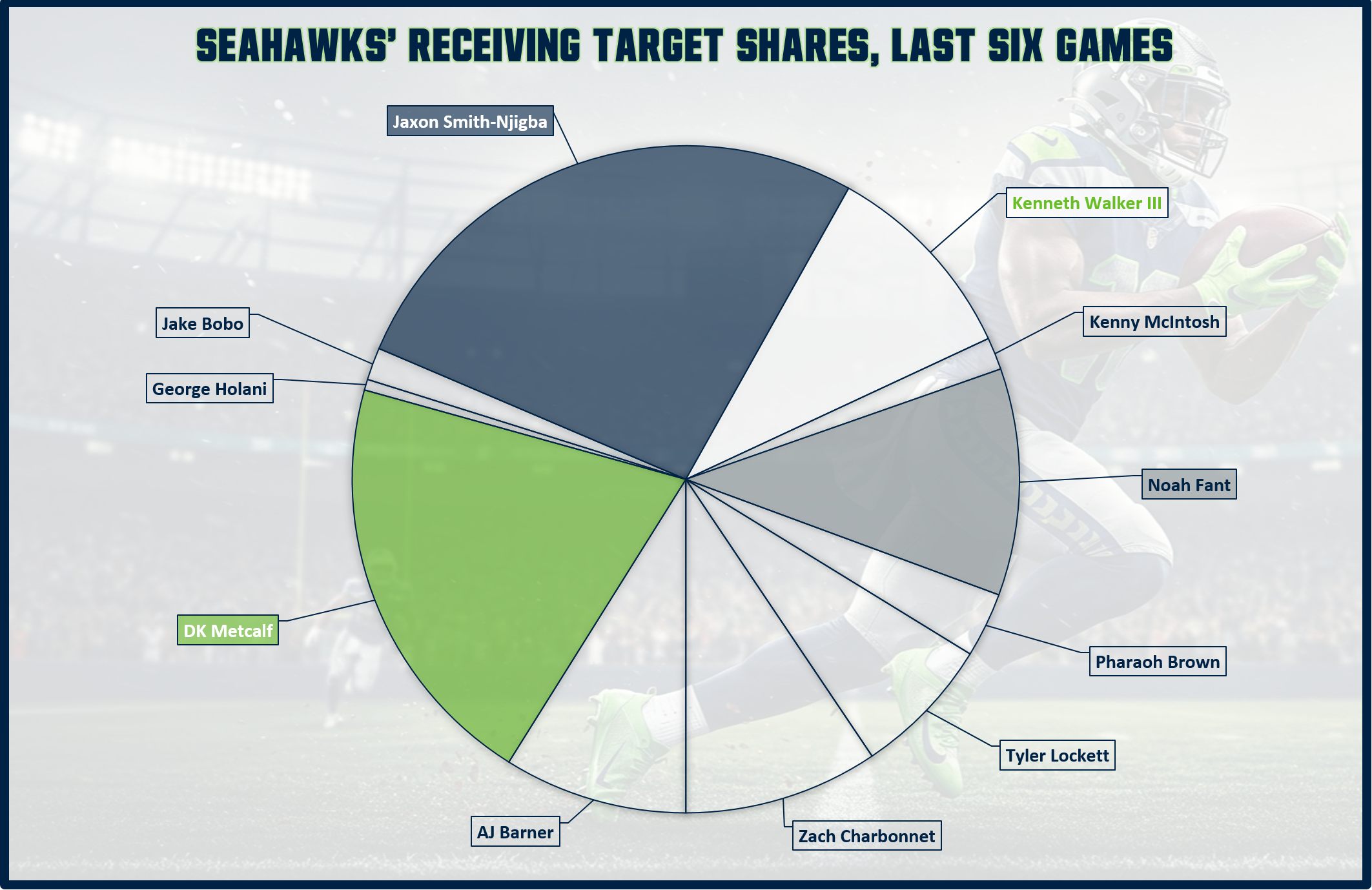
Fant is unrealistic for a single-TE league without a terrific matchup and a little desperation; he ranks 30th in PPR/G. Tyler Lockett has long been a fantasy fixture but has faded completely, likely starting out over the hopeless edge of the age cliff with nowhere left to go. Fantasy managers who have been paying attention dropped Lockett long ago.
At this point, the only two highly viable pass-catchers in Seattle are Smith-Njigba and Metcalf. Last season, Smith-Njigba was a disappointment after entering the league with much fanfare from the dynasty community. The two were more or less even in usage this year, with Metcalf only slightly ahead in EP until Week 7. Metcalf missed Weeks 8-9, followed by a Week 10 bye. Upon his return, he has only exceeded Smith-Njigba in EP twice out of six games, and in the past two games, Smith-Njigba has led by 24.2 EP—12.1/G. These are still officially small datasets, but the most likely scenario is that Smith-Njigba has officially surpassed Metcalf to become the team’s No. 1 receiver.
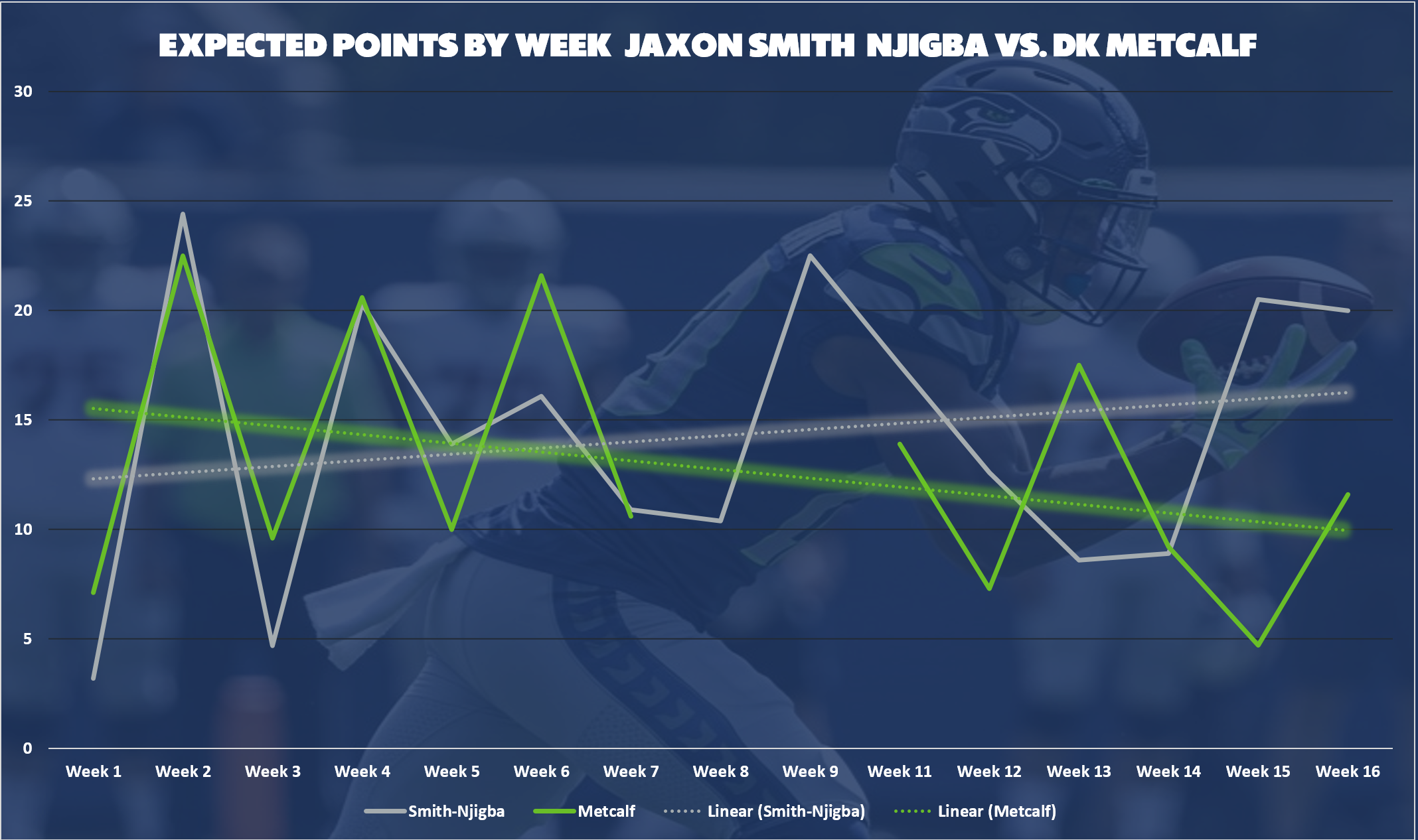
Chicago uses zone defense at the fifth-highest rate at 76.3%. Their most common alignment, like most, is Cover 3, but Chicago uses Cover 3 at the second-highest rate at 42.4%. They play single-high, middle closed sixth-most in the league, reinforcing run defense and trying to keep the intermediate middle covered, allowing some degree of weakness on the deep hashes.
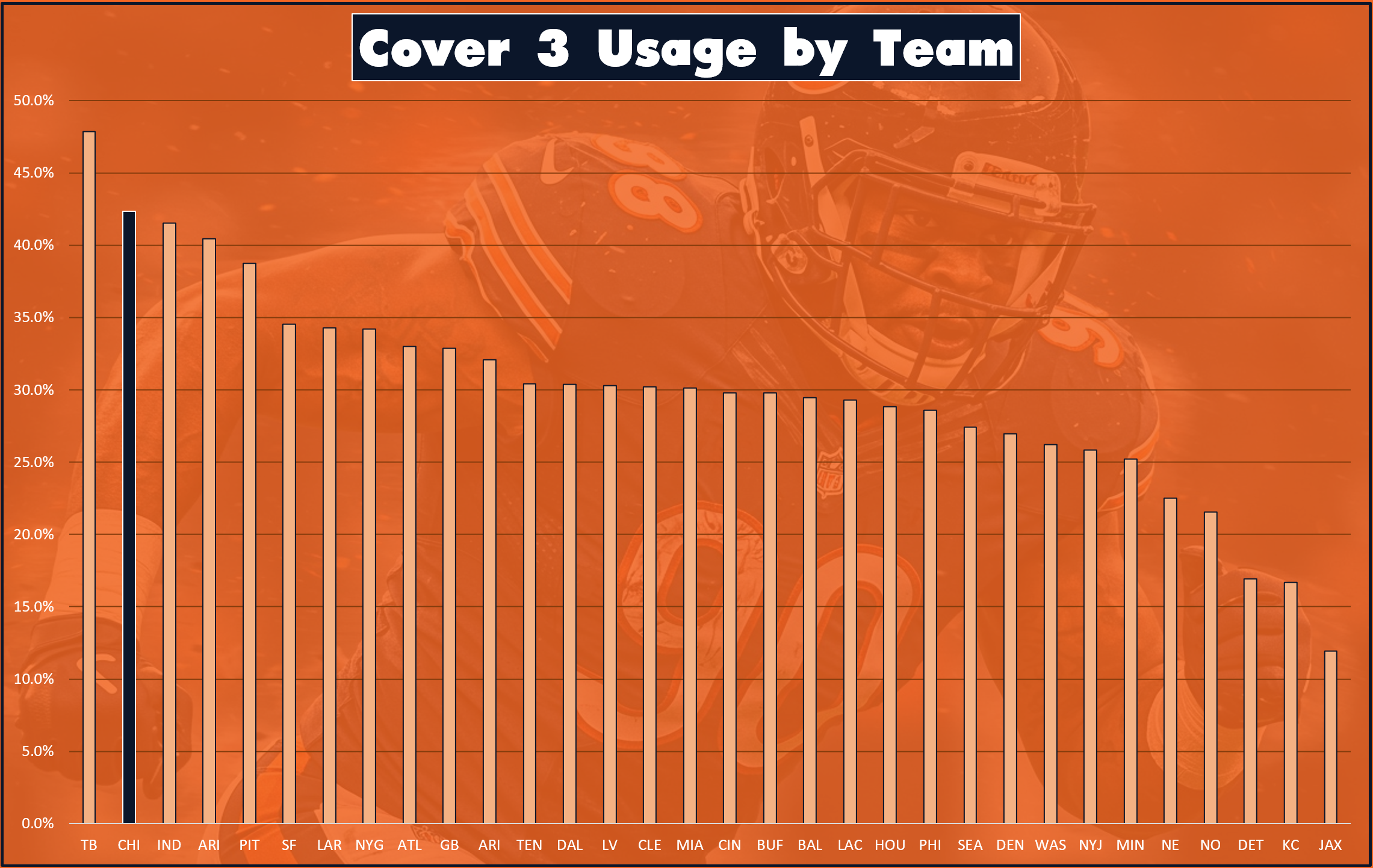
Geno Smith has performed slightly below average against the types and rates of coverages the Bears utilize. He ranks 20th among all Week 17 QBs in Fantasy Points’ Matchup Expected Fantasy Points model. He struggles, in particular, against Cover 3, ranking 25th in fantasy points per dropback against it.
The Bears rank 12th in EPA per dropback allowed and 18th in defensive success rate on dropbacks.
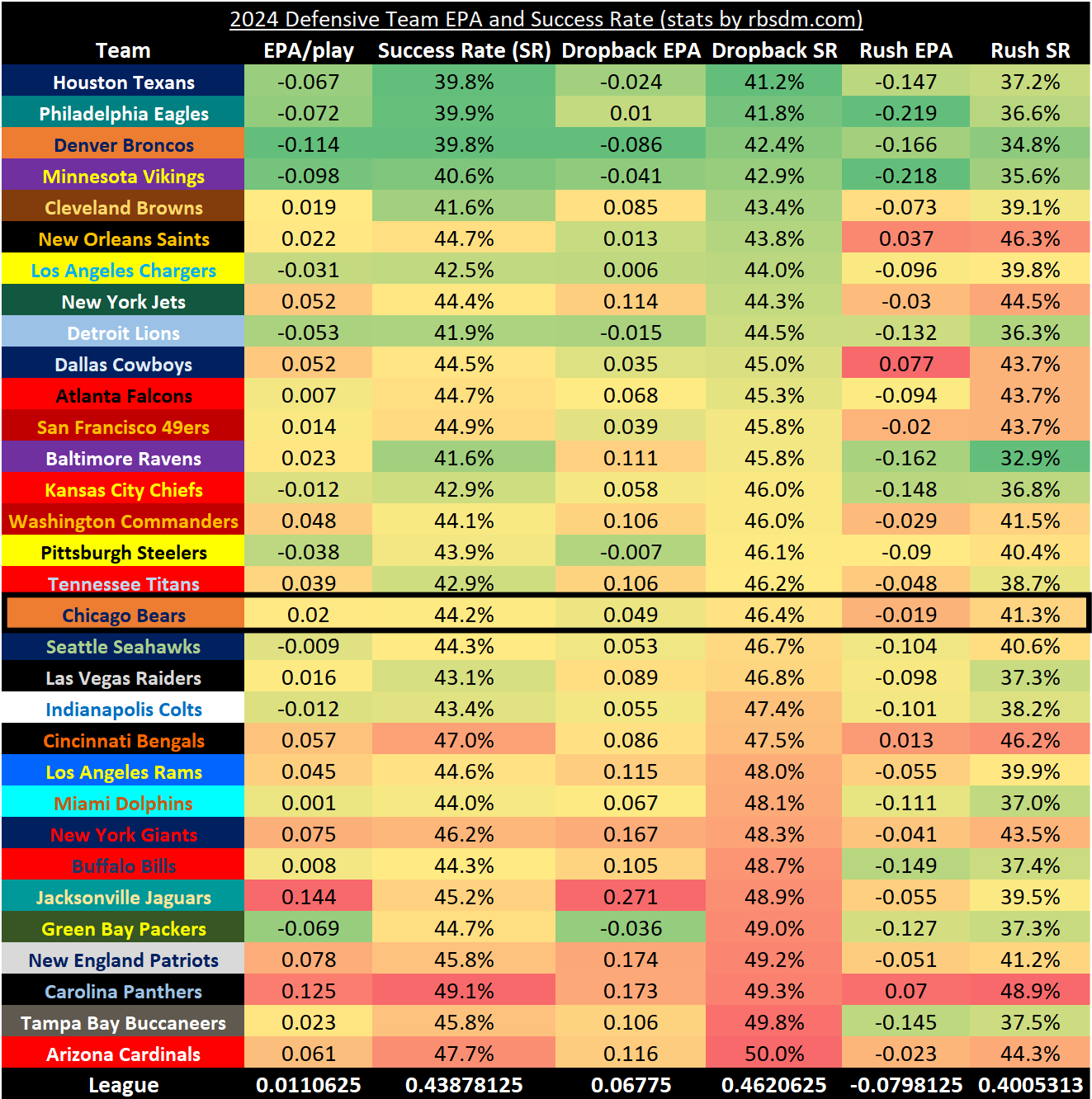
When Matt Eberflus took the Bears’ HC job after a successful run as a DC in Indianapolis, he initially hired DC Alan Williams, who called plays. In 2022 and for one week in 2023, Williams called a defense that allowed 27.8 PPG. Eberflus took over when Williams suddenly resigned after Week 1 in 2023, and this average dropped to 21.3 PPG. This added success was likely the impetus for Eberflus retaining play-calling duty in 2024.
Initially, the defense seemed stouter this season than before, hovering in between 17-19 PPG allowed for their first 10 games. This PPG allowed average crawled up from 18.7 to 20.0 in two weeks immediately preceding Eberflus’s termination (I mention this only to be fair in that the Bears may have already charted a downward trajectory before Eberflus was gone). But since Week 14, the defense has only been far worse. By the end of Eberflus’s 2024 campaign, the Bears had surrendered 20.0 PPG; in the three games since he departed, they have surrendered 34.0 PPG.
